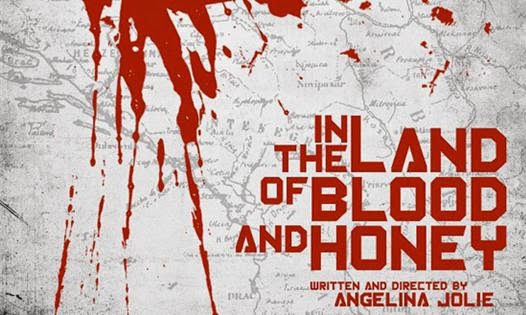 In the Land of Blood and Honey (2011) is not the sort of film you would expect Angelina Jolie to make. As war films go it's bleaker, gorier and more shocking than most. It tells the story of Ajla (Zana Marjanovic), a Bosnian Muslim living in Sarajevo at the outbreak of the war in 1992, and her relationship with her Bosnian Serb prison guard, Danijel (Goran Kostić), as the war progresses.
In the Land of Blood and Honey (2011) is not the sort of film you would expect Angelina Jolie to make. As war films go it's bleaker, gorier and more shocking than most. It tells the story of Ajla (Zana Marjanovic), a Bosnian Muslim living in Sarajevo at the outbreak of the war in 1992, and her relationship with her Bosnian Serb prison guard, Danijel (Goran Kostić), as the war progresses.
It’s a daring premise for a film about so recent a war. When it premiered in Sarajevo, audiences were moved to tears by the memories that film brought to the surface; it is certainly jolting to see images of Sarajevo under siege again. The treatment of women during the Bosnian war is a topic that is being explored more and more, in academia and literature, and although it is laudable what Jolie is trying to do with this film, unfortunately, it just doesn’t work. Watching it, you feel you are being shown a clumsily polemic humanitarian lecture rather than a work of any true artistic value.
For starters, the film doesn't appear to know if it's a love story or a psychological exploration of the relationship between captor and prisoner. Viewers are unsure if we are supposed to feel sympathy for Danijel, as a man overtaken by his circumstances, or to abhor him as a weak-willed misogynist. If the former, then sadly Danijel is such a creepy and unlikeable character that it is impossible to feel sorry for him. The chemistry between the two leads throughout is uncertain, as though they are equally unsure how to feel about their characters.
Aside from taking some locational liberties with Sarajevo, there are number of dubious directorial calls in the film. Including gratuitous female nudity in a film about the objectification of women and juxtaposing quasi-romantic sex scenes with scenes of systematic rape seem nothing more than distasteful. The war was awful. It was messy and confusing and people did terrible things to one another, and any film about it will necessarily be harrowing. In the Land of Blood and Honey, however, dwells on the violence with very little exploration of the motivations and feelings of the individuals involved.
Of course, these complaints would have been obscured by a stronger story. At heart, this is a weak story, poorly told. The action jumps from scene to scene, seemingly too desperate to educate and shock in equal measure; there is no build-up of suspense and we are never given the opportunity to really get to know the characters. The result is that the unsettling relationship between Danijel and Ajla is utterly incomprehensible.
The title itself is a controversial choice, evocative of Robert Kaplan's Balkan Ghosts and the myth of ancient hatreds that influenced John Major's thinking during the war. Presumably the honey is supposed to be the sweet antithesis to the blood soaking the land, but there is very little sweetness in this film. Coffee might have been a more appropriate choice.
It is estimated that up to 60,000 women were raped in prison camps during the Bosnian War. Their suffering, and that of women in all wars, is a commendable cause to highlight, but there have been better films made about the impact that this sexual violence had on Bosnia’s women (Esma’s Secret/Grbavica (2006), for one). Since In the Land of Blood and Honey was released, when people find out that I have studied the Bosnian War they often ask if I have seen it. Now I can say that I have – and that I wouldn’t recommend it. If you’re looking for good films about the Bosnian War, Hollywood has done it far better in Welcome to Sarajevo (1997), and Bosnians excelled at it in No Man’s Land (2001). In both educational and artistic terms, this film has sadly little to offer.
Originally posted at www.elliewilsonwrites.co.uk


